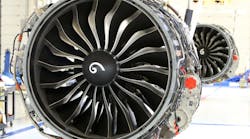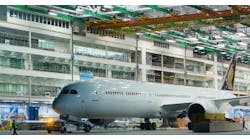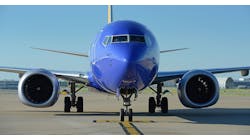CFM International reported it has a series of new agreements with American Airlines for LEAP-1B engines, covering the carrier’s entire fleet of 737 MAX aircraft. The LEAP-1B is the high-bypass turbofan engine customized by CFM for Boeing’s twin-engine narrow-body jet – of which American currently has 56 in service and dozens more on order.
Financial terms were not provided.
In addition to LEAP engines for new aircraft, the agreements cover purchases of spare engines and a 20-year service agreement for both new and existing LEAP-1Bs in American Airlines jets. The scope of service will cover more than 400 engines, according to CFM.
Recently American booked orders for 85 new 737 MAX 10 jets, and converted 30 previous orders for 737 MAX 8 jets to the larger MAX 10 variant. “Over the past decade, we have invested heavily to modernize and simplify our fleet, which is the largest and youngest among U.S. network carriers,” stated American Airlines CFO Devon May. “We’re very pleased to partner with CFM to service our entire Boeing 737 MAX fleet with newer, more efficient engines so we can continue to deliver the best network and record-setting operational reliability for our customers.”
American’s fleet currently includes 52 Boeing 737 MAX 8s, but it is due to add a total of 132 more MAX 8s and MAX 10s in the years ahead as it modernizes and expands its fleet.
The LEAP-1B is the Boeing-optimized variant of the LEAP engine series developed by CFM – which is a joint venture of GE Aerospace and Safran Aircraft Engines. The two partners manufacture the engines at their respective locations. According to CFM, the LEAP engine series offers 15-20% better fuel consumption, lower CO2 emissions, and improved noise compared to the preceding generation (CFM56) engine.






